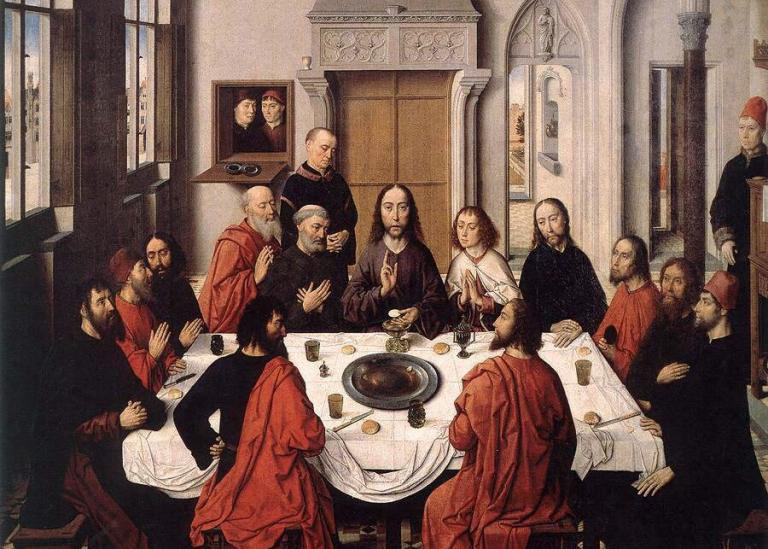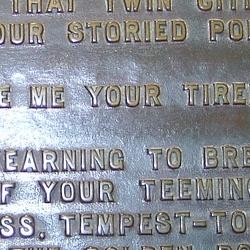
Of late, the anonymous blogger, five-pointer, and crack theologian TurretinFan—known on this blog as Amazing and Undaunted Mr. X of Calvinism—has been struggling with the concept of metaphor as it applies to John 6. (And a very hard struggle it has been, too; see his two blog posts here and here.) He argues that the expression “this cup is my blood” (Matt. 26:28; Mark 14:24; Luke 22:20; 1 Cor. 11:25) should be a clear sign that the text is not meant to be taken literally. For not even Roman Catholics will say that the cup itself is Christ’s blood. Obviously Christ is speaking metaphorically here.
The poor man apparently needs the help of an English teacher. It is good for Mr. X that I am here. The assumption his argument relies on is this: that, if one thing in a passage is metaphorical (“this cup”), therefore everything in the passage is metaphorical (“my blood”). But no.
Now, the technical name for the figure of speech Christ is using here is metonymy. In a metonymy, either a part is substituted for a whole, or the whole for a part. Thus, in “this cup is my blood,” the cup itself is substituted for its contents. (It would seem Mr. X would have no problem with the Roman Catholic argument, if only Christ had said, “This cup contains my blood.”)
Here are some other metonymies:
I. “Roma locuta est; causa finita est” (St. Augustine). Here “Rome” is substituted for “the Church”; or, “the pope.”
II. “Bell, book, and candle shall not drive me back” (Shakespeare, King John, III.iii.12). Here, “bell, book, and candle” are substituted for “excommunication.” What the bastard son Philip (Philip II of France) means is that, even should he be excommunicated, he will not be driven from his purpose (the rebellion of Aquitaine against King John). He does not fear the Church, which means he does not fear God.
III. “The pen is mightier than the sword.” Here “pen” is substituted for “literature,” or “writing”; and “sword” is substituted for “war.” Bulwer-Lytton does not mean that pens literally have more power than swords do, but that writing has a greater effect on the course of history than war.
So far so good. All this is nothing more than a well-known fact of how people use words. But let us look at some other metonymies, this time from Scripture itself.
I. “And the Lord said to her, Two nations are in thy womb” (Gen. 25:23). Of course, Rebekah was not literally carrying two nations in her womb. That would have caused some pain. But she had asked God why her unborn twins—Jacob and Esau—“struggled together within her.” His answer was, in effect, that Jacob and Esau would each be the father of separate nations (the Israelites and the Edomites) that would war with each other.
We should be careful, here, though: Just because two nations were not literally in Rebekah’s womb, that does not mean that the nations themselves were metaphors. The Lord was not saying, “Jacob and Esau fight together as though they are two nations at war.” No. The two nations were very real, very literal nations—it is just that they were not physically located within Rebekah’s womb; only the fathers of those nations were. Not everything in this text is a metaphor.
II. “At the mouth of two or three witnesses, shall he that is worthy of death be put to death” (Deut. 17:6). Now, obviously God is not mandating here that two or three mouths be the literal instrument of execution. This is not the plot of Twain’s “Cannibalism in the Cars.” Here, “mouth” is substituted for “testimony in court,” and the meaning is that two or three witnesses’ testimony be sufficient to justify a sentence of death. But: Although “mouth” is used metaphorically here, “death” is not. This is not a metaphorical execution God is speaking of here, but a literal one.
In a like way, just because Christ uses “cup” as metaphor does not imply that he uses “blood” that way too. We must not be sloppy. We must not, as students of literature, get so excited by having found a symbol, or a metaphor, that suddenly everything becomes symbol or metaphor. Sometimes a pencil is just a pencil, Mr. X.
But alas! Mr. X goes even more astray than that. For he attempts to find other texts, elsewhere in the Bible, in which the word “blood” is used metaphorically (such as 2 Sam. 23:13-17), and then claims that if it was metaphorical in 2 Samuel, it must also be metaphorical in John 6 and at the Last Supper.
That is mad. Why not go all the way, Mr. X, and tell us that “blood” is metaphorical at the crucifixion, too? Mr. X will protest that that is absurd. I agree. Just because it is a metaphor here does not mean it is a metaphor there.
Or perhaps the deluge didn’t consist of real water. No; mankind were just metaphorically drowned. And the ark was just symbolic of the shelter from the consequence of sin, enjoyed by the Elect. Right, Mr. X?
But you can’t say that, if some passage in the Old Testament is metaphorical, this other passage in the New Testament must be as well. For taken to its logical consequence, that would mean either that the Bible is entirely literal, or that it is entirely metaphorical. Both positions are absurd. Rather, the only line of reason into the discussion of John 6 must be to ask why we should take this passage either literally or metaphorically. The existence of metaphor elsewhere in the Bible is of no meaning at all.
That will be the question I take up in a future post.
***
If you like the content on this blog, your generous gift to the author helps to keep it active. I remember all my supporters in my Mass intentions each week.












